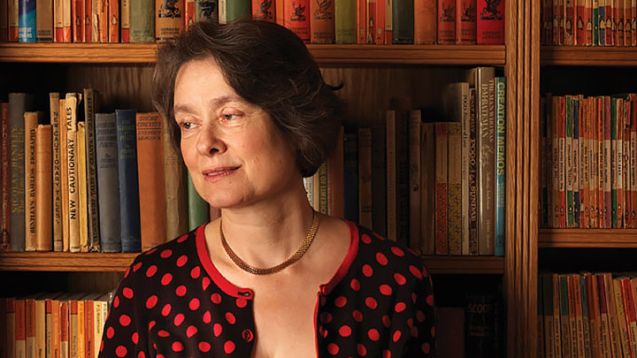Last week, Dr. Sarah Coakley, a professor at Cambridge University, gave two lectures at this year’s Stob Lecture series titled “Is There a Future for Sacrifice?” The lecture series is hosted annually by Calvin College and Calvin Theological Seminary and focuses on subjects related to ethics, apologetics and philosophical theology.
Coakley, the Norris-Hulse Professor of Divinity, holds the chair in philosophy of religion at Cambridge and carries an impressive resume, having held previous positions at the Universities of Lancaster, Oxford, Harvard and Princeton.
The lectures centered on meanings of sacrifice, specifically including notions such as offering, destruction and substitution. On her first lecture last Wednesday, titled “Modernity Against Sacrifice: From Kant via Girard to Contemporary Feminisms,” Coakley described sacrifice as a messy and paradoxical thing. The aim of her lectures were to question if there can be such a thing as a living and rational Christian practice of sacrifice, and if so, what sort of rationality would this entail, and how would we relate to this Christian sacrament.
On Wednesday’s lecture, Coakley offered critiques of two separately prevalent theories of sacrifice as violent and patriarchal. French philosopher and literary critic Rene Girard primarily developed the idea of sacrifice as violent, upon his concept of mimetic desire. Coakley explained Girard’s understanding of this desire to be expressed in terms of “I always want what you want.” This sort of mimesis expands to a desire across society that leads to rivalry and conflict among one another. What is required, then, is a mechanism of scapegoating that can act as a release for these societal pressures. And it is this idea of scapegoats that Girard identifies as being potentially violent.
In her critique of this theory of violent sacrifice, Coakley pointed out the deep theological problem of an ontology of violence. For Coakley, when Girard paints humans as inherently violent in light of his sacrificial theory, Girard replaces God’s creation with the murderous Cain. Coakley also noted Girard’s highly rationalistic view of Christian sacrifice that carried with it strong traces of Kantian influence as problematic.
However, in an opposition to Girard’s theory of violence, Coakley presented a feminist approach to sacrifice. Utilizing the example of motherhood, Coakley represented sacrifice in terms of childbearing. While childbearing is painful, it ultimately yields a fruitful end. Out of the maternal sacrifice comes the joy of childbirth. But in this view, sacrifice is inherently patriarchal in that sacrifice is exclusionary to women.
Coakley’s second lecture on Thursday picked up from this point. Developing her analysis of sacrifice in a Christian context, Coakley delivered a lecture titled “Retrieving Sacrifice: Why a Classic Christian (and Reformed) Theme Refuses to Die.” Shifting gears to a focused consideration of Reformed Eucharistic theology, Coakley argues that “there is substantial theological devaluation of the transcendent and transformative meaning of the eucharist if gift simply replaces sacrifice, and that unfortunate moral consequence may accrue.”
After a brief treatment of Martin Luther’s writings of the Eucharist as gift and sacrifice, Coakley turned her attention to John Calvin and his important ideas of sacrifice. For Calvin, sacrifice is at the heart of his Christology. Arguing “for an integrated understanding of the relation of gift and sacrifice in the crucifixion and Eucharist, and for a prayer-based account of the graced extension of this once-for-all gift/sacrifice in the sanctioned life of believers,” Coakley emphasized the role of Eucharist as gift and sacrifice. If a gift is to come without any sacrifice, it brings itself more akin to the likes of cheap grace, as Dietrich Bonhoeffer would say. Thus, as particularly communicated in Calvin’s thought, our fear of God that is transformed by sacrifice into a father love marks the fall of patriarchalism. For Coakley, it is the Eucharist that undoes the instituted patriarchy of sacrifice:
“Here the sacrifice connotes a voluntary submission to the Spirit’s conjoining of the Christian in an ever-deepening union with Christ, which at the same time releases the believer into the transformed ‘rationality’ or the ‘sacrifice of praise.’ Deep prayer and Eucharistic celebration thus necessarily hang together.”







